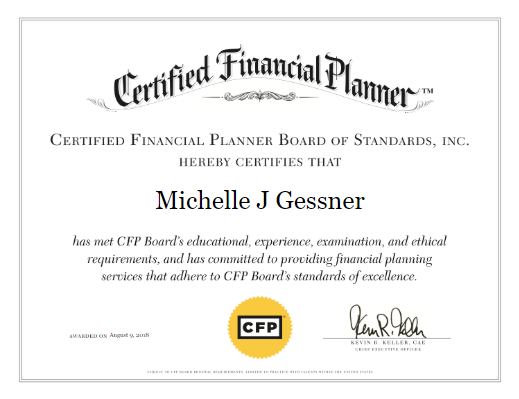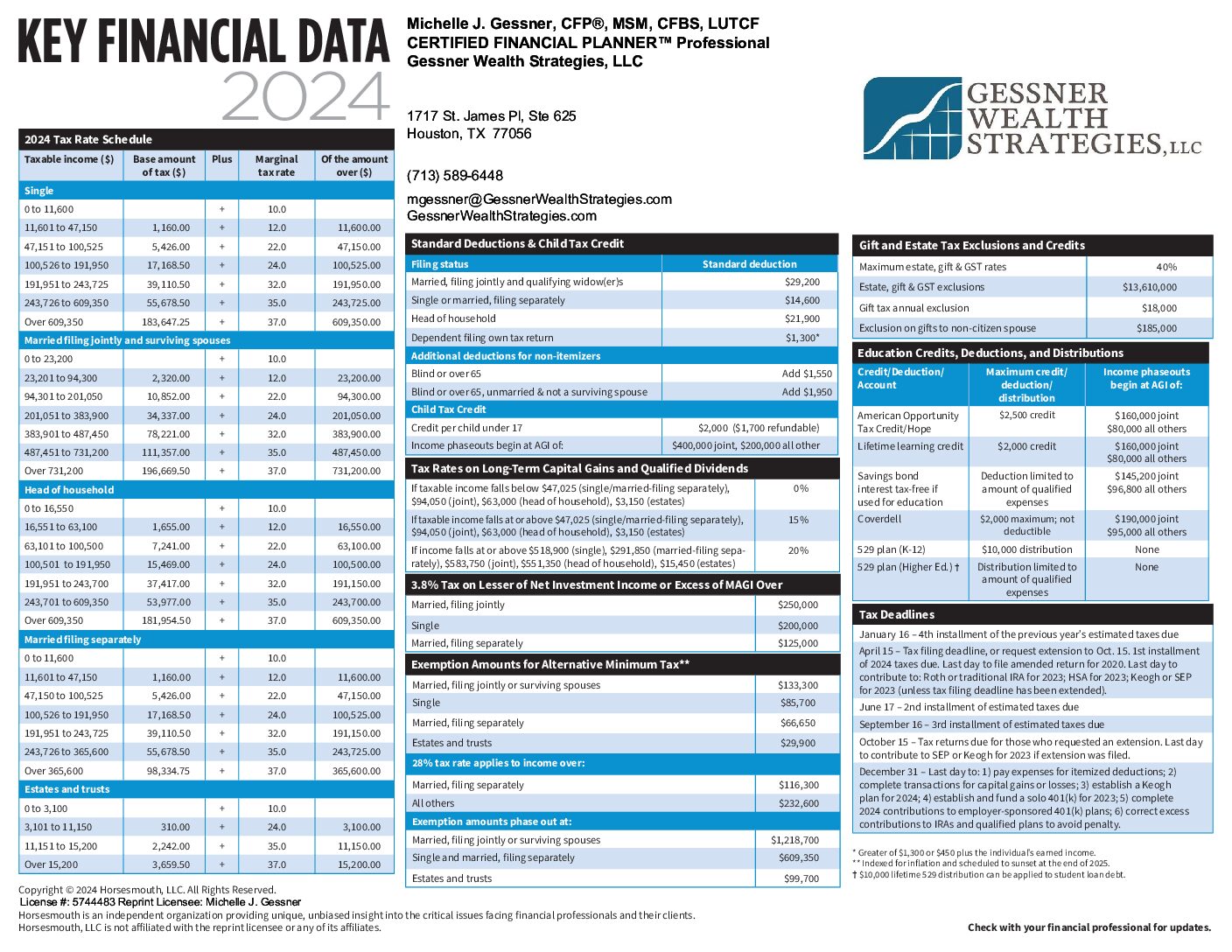Retirement planning can feel overwhelming. It is essential to make sure that you have saved enough money and planned out your future in order to be able to enjoy life without any financial concerns. Navigating these kinds of financial decisions is a challenge at any age, let alone in your golden years.
However, the good news is retirement planning does not have to be that way. I’m Michelle Gessner, and as a CERTIFIED FINANCIAL PLANNER™ (CFP®) professional, I have been helping Houston residents plan their retirement for over a decade. I am also a part of the Ed Slott Master Elite Advisors GroupSM as well, which means that I spend many hours every year studying tax and estate planning changes that could potentially impact your retirement.
This article answers the following questions:
- How do you know when you’re ready to retire?
- Is it possible to know how much money you will need?
- When is converting an IRA to a Roth IRA beneficial?
- What makes spending down a bad idea before retiring?
- Why is volatility to be expected, periodically?
What follows is a guide to help you find the answers to some of the most important questions we face when planning our retirement.
Retirement Planning in Houston—How to Know When you are Ready to Retire

If you know what you want to do with your life after retirement, then it is time to consider the second major factor of preparation—what kinds of income sources will support your desired lifestyle during those years?
Finding the answer starts with looking at whether or not your investments and other income sources can be adjusted to maintain the quality of life you want. This exercise also includes figuring out what your basic housing, food, healthcare, and other expenses will be throughout retirement.
Before you retire, it is important to understand what your retirement goals are as well. We suggest creating a comprehensive financial plan with stress testing along the way to serve as a road map for measuring your progress toward your saving and investing objectives.
To vastly increase the chance for a happy and fulfilled retirement, be sure that you have a solid social support system. Your loved ones and friends are the most important aspect of this process. They can help provide the comfort and companionship needed once you stop working. In addition to having them around as support, volunteering is also an excellent way to stay active and feel purpose while keeping connected with other people.
Make sure you have things to look forward to after leaving the workforce as well. You may enjoy taking time to participate in some of your favorite hobbies and activities, such as traveling, spending more time with family and friends, or simply relaxing in the outdoors and enjoying nature's beauty by hiking, swimming, and so on.
If you have no idea where to begin with your retirement financial planning, consider getting help from someone who has experience in assisting clients with their financial needs. A qualified wealth manager can help guide you through all aspects of preparation; from setting up an IRA or 401(k) account and choosing which investment vehicles are right for your situation to calculating how much money is needed now and how much to set aside, what inflation factor to use, tax implications, and strategies to reduce taxes.
CFP® in Houston: How Much Income You Will Need and How To Calculate It

A good assumption is that if you are living paycheck-to-paycheck today (having no savings), your retirement planning should take into account having only Social Security benefits as an option for funding your lifestyle. You should also consider how much income the Social Security Administration projects they will pay out over time and then factor these benefits into your calculations.
Meanwhile, you may already have some savings built up, but chances are good that you will want more out of life than simply waiting until death arrives before enjoying any luxuries again. There are many ways to potentially increase your chances of higher returns while taking less risk by using different investment methods. For example, including mutual fund or ETF investing rather than stocks alone allows an opportunity for increased diversification within a portfolio without sacrificing possible gains.
In order to figure out how much you will need to save for retirement, there are two initial steps:
- Estimate your savings requirements. How much income will you need each year? This depends largely on your age and lifestyle at the time of retirement. For instance, a 65-year-old couple might need $50,000 per year in retirement income while a 55-year-old single person might only require $35,000 per year (assuming they want roughly similar lifestyles). Although it is impossible to predict exactly how long we will live into our golden years, most financial planners recommend saving enough so that the money lasts at least 25 years after your expected retirement date. 2.
- Determine how much money you will have saved. Gessner Wealth Strategies may be able to help you work proactively to increase this amount. In fact, the more long-term an approach we can take, the more likely we can strategize a better outcome.
Advanced Retirement Strategies From One of the Best Wealth Management Firms in Houston

Once you have clearly defined the two, start thinking about how much money you will need each month (or each year) in order for basic necessities to be covered comfortably without worry or stress on your part. When you know you can cover these retirement living expenses comfortably, it may be time to ponder how you might spend your extra cash.
Also, proper investment allocation strategies will vary for these two different types of expenses so it is important to understand the difference between your fixed (non-discretionary) expenses vs. discretionary expenses.
In the meantime, assess your current financial situation. Are you on track for retirement? Have you considered your other sources of income in retirement? Take some time to be realistic about your situation and understand the potential barriers.
- How much time is left until you retire? If your retirement is soon, it might not be realistic to expect to catch up on all of your retirement savings. There may be some options, but evaluating what is and is not feasible now is important.
- What can you realistically do? It is vital to determine your options, based on your current resources and investments, such as cash flow from Social Security benefits or pension checks from work (if applicable). You can then determine whether your current income allows saving more money each month without sacrificing essentials such as food or rent payments.
- How might things be changed? There may be certain options that are not possible right now, but could happen later in life when things improve financially. For example, downsizing your home so there is room for additional expenses may help.
Be prepared to revise your strategy, if necessary. The idea is to monitor your progress as you go, adjusting your course if you notice that something is not working, especially when stress testing is applied to ensure that your plan is solid. It is important to stay flexible, possibly even with regard to the timing of your retirement.
How Financial Advisor Tax Strategies in Houston Can Help You Retire Sooner

When the time comes for retirement, Roth IRAs (after reaching age 59½, which is when you are eligible for penalty-free distributions from your regular IRAs), allow several options. Some people opt to withdraw all at once (sometimes referred to as "spending down"). Such an approach is generally not recommended.
Spending down exposes the assets in your accounts to market risk at once, effectively leaving them vulnerable to market volatility. Instead, you might prefer to spread out distributions over several years, taking an amount each year until all assets have been withdrawn gradually.
Converting a traditional IRA to a Roth IRA is a great way to hedge against rising taxes in retirement. However, a conversion is not suitable for everyone, and there are many factors to consider. You do not need to have earned income to execute a Roth Conversion and there is no age limit, but you must be able to pay the taxes on the amount you convert.
If you are considering a Roth Conversion, take some time to weigh the pros and cons of each type of account first. For example, if taxes are expected to increase (or if your tax bracket could rise after retirement due to high RMDs), then converting some or all of your traditional IRAs may be worthwhile.
Meanwhile, other factors should also be taken into consideration before pursuing this strategy. For example, paying the taxes due on a Roth Conversion out of the account itself could result in potential losses or tax penalties or other unintended consequences, such as triggering Medicare surcharges, if the right amount is not used for the conversion.
Fiduciary Advice in Houston: Protect Your Retirement Nest Egg in Turbulent Times

Investors have been understandably tempted by shorter-term opportunities that appear to offer some hope of higher returns. In exchange for increased risk, some assets offer more than might potentially be expected from traditional long-term investments. On the surface, it may not look bad.
The problem with some short-term strategies is that they can lead to impulsive decisions or knee-jerk reactions—and these behaviors can expose investors not only to losses, but to costly taxes on capital gains, if you are not careful. We understand the temptation to react emotionally to volatility by moving your investments out of the market and into other types of investments that may appear more secure.
Short-sighted approaches may backfire. A better choice may be a diversified portfolio consisting of stocks, fixed income assets, and alternative investments to provide an effective way to withstand long-term market downturns (and often, generate growth that keeps pace with inflation over the long term).
A fiduciary financial advisor can provide objective advice based on your best interests rather than personal gain or bias toward a particular financial product or service provider. We never tell people how to spend their money, but we will try to warn you if you appear to be rushing headlong into a financial mistake.
The hard truth is that the market is never static. Stocks are like weather patterns: There will always be volatility from time to time, as investors react to changing economic conditions and anticipate future developments. So, avoid dropping your investment strategy when the skies cloud over. Even though the market is volatile right now, the sun is likely to shine again—and consistency often leads to better returns in the long run.
If you are concerned about market volatility and want to protect your retirement nest egg, fight the urge to abandon your long-term investment strategy. In today’s economic circumstances, it is especially important to maintain discipline with your portfolio. Consider getting a portfolio review from a trusted wealth manager.
A second opinion on your portfolio can be compared to receiving a physical from a doctor. In exchange for letting us take your financial pulse with our training and experience, your long-term savings and investments may end up healthier.
Working With a CERTIFIED FINANCIAL PLANNER™ in Houston Texas Could Save You Plenty in Taxes

Half of all Americans use some kind of software to help them file their taxes. Unfortunately, many of them still make mistakes. A CERTIFIED FINANCIAL PLANNER™ practitioner in Houston can help you avoid costly mistakes. As a financial advisory firm, we routinely offer a projection for our clients’ returns before they are sent off to the IRS, looking for ways to reduce taxes in the current year before it is too late to apply the strategies.
No one wants to pay penalties and interest for filing an incorrect return or pay too little on their taxes for the year, resulting in a nasty tax surprise. If you have ever tried to negotiate with the IRS on an outstanding audit or other problem, you may already know how difficult it can be to get answers or explanations about the process.
Gessner Wealth Strategies can help you make sense of the rules and offer potential options that you can review with your tax advisor. We cannot guarantee results, but knowing what questions to ask often makes a big difference.
If there are problems with a return—whether it is because of an error or because of changes in the law—we can help you through the process with your tax advisor. Working with us proactively may also help prevent issues altogether.
For example, several states changed their laws around retirement plans for small businesses and sole proprietorships over the last few years: Many people didn't realize what those changes meant for them until after filing their returns (or after being notified by a letter from their state’s tax authority).
In a perfect world, retirement in Houston is carefree and 100% bliss. While we cannot guarantee total bliss, we can help you avoid tax, investing, and savings-related mistakes. The sooner we sit down together, the better chance we have to streamline your finances, make an impact, start tax planning, and get you closer to your goals. Contact us today.








